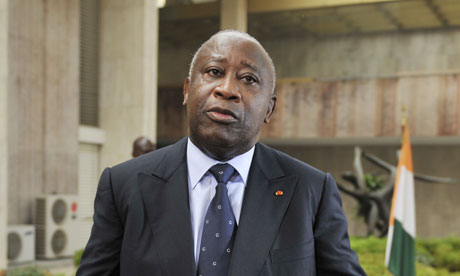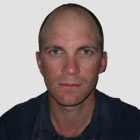Laurent Gbagbo, alone and shunned by African leaders
Decisiveness surprised many but neighbours and regional players have own reasons for wanting peace in Ivory Coast

On a continent not known for its intolerance of leaders who refuse to give up power, the Ivory Coast's Laurent Gbagbo now stands increasingly isolated. His last remaining ally, Angola, which provided key support during the early days of his "constitutional coup", called for his immediate resignation on Thursday at a meeting of southern African leaders, sealing his isolation.
The response of African leaders to the intransigence of Gbagbo, who rejected the official UN-endorsed election results after the much-delayed poll on 28 November, appears to have taken him - and many observers - by surprise. Most of the impetus has come from his neighbours.
Just a day after Gbagbo was sworn in on 4 December, Ecowas, the regional bloc of 15 west African states, said it "strongly condemns any attempt to usurp the popular will of the people" of Ivory Coast. Two days later, it suspended the country's membership, and called on Gbagbo to cede power to Alassane Ouattara, who comfortably won the presidential election.
The perceived importance of the poll in uniting Ivory Coast after the conflict in the early 2000s was one reason for the firm action. Equally crucial were fears that a new civil war could affect regional stability, as had happened before in inter-linked conflicts involving Ivory Coast, Liberia, Sierra Leone and Guinea.
But individual countries had their own motivations. Rinaldo Depagne, west Africa senior analyst at the International Crisis Group, said Burkina Faso was the country most concerned by Gbagbo's stance. More than 2 million of its citizens live and work in Ivory Coast. If they all suddenly were forced to return home - anti-foreigner sentiment is high among Gbagbo's hardline supporters - it would present huge challenges for President Blaise Compaoré, who had previously served as a mediator in Ivory Coast.
"He does not have the resources to feed all those mouths," said Depagne.
The second country exerting strong influence, he said, was Nigeria, under President Goodluck Jonathan, who is eager to boost his country's image and reputation on the world stage.
As per protocol, the Africa Union followed the lead of the regional bloc, and suspended Ivory Coast on 9 December, until Gbagbo ceded power. There were dissenters, however, most notably Angola, which sent representatives to observe Gbabgo's swearing-in. While not openly supportive of Gbagbo, South Africa trod carefully, urging the need for reconciliation – and attracting much criticism in the process.
But even as mediation efforts were stepped up,Ecowas became bolder, declaring on Christmas Eve that it might use "legitimate force" if Gbagdo did note cede power. The Central Bank of West African States transferred authority over Ivorian funds to Ouattara.
Dimpho Motsamai, a researcher in the African conflict prevention programme at the Institute for Security Studies in South Africa, described Ecowas's swift action as "momentous". Besides seeking to prevent conflict, she said it was also designed to set a precedent in west Africa, where several elections were due to take place this year.
With all attempts at mediation failing - Gbagbo has repeatedly rejected offers of a "safe and dignified" exit - the African Union reaffirmed its recognition of Ouattara as the rightful leader of Ivory Coast in March. South Africa also called on Gbagbo to step aside last month before Angola did so too, at a meeting of the Southern African Development Community last week.


No comments:
Post a Comment